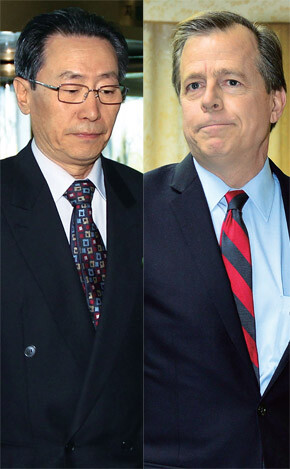hankyoreh
Links to other country sites 다른 나라 사이트 링크
China seeking resumption of six party talks without preliminary steps by N. Korea

By Gil Yun-hyung, Tokyo correspondent, Park Hyun, Washington correspondent and Park Byong-su, staff reporter
China’s proposal for resuming the six-party talks did not contain a request for North Korea to take preliminary action.
Chinese diplomat Wu Dawei presented a seven-point compromise proposal to the talks’ member countries and suggested that the talks resume in the spring of 2014, Japan’s Yomiuri Shimbun reported on Nov. 22.
Wu Dawei, China's special representative for North Korea policy, is China’s envoy to the talks as well as the president of the talks. But since the proposal does not contain the “credible preliminary measures” that the US has demanded as a precondition for resuming the talks, it appears to have failed to gain American approval.
According to the Yomiuri Shimbun, the proposal presented by Wu called for the following action: for the participating countries to agree to resume the talks and implement the Sept. 19 2005 joint statement; to denuclearize the Korean peninsula; to address matters of interest to North Korea during the process of denuclearization; to work to improve the bilateral relationships between South Korea, the US, Japan, and North Korea and for the US to indicate that it has no intention of overthrowing the North Korean regime and that it is willing to sign a non-aggression pact; to engage in negotiations to change the armistice agreement that ended the Korean War into a peace treaty; to stick to the principle of action for action; to operate five working groups; and to hold six-party talks on a regular basis.
The Yomiuri suggested that the “matters of interest to North Korea” appeared to refer to revoking economic sanctions against the North and engaging in economic cooperation.
An official with the South Korean Ministry of Foreign Affairs said that he was unable to confirm the report but also did not deny it.
However, the US is not responding positively to China’s attempt to mediate. During a press briefing held on Nov. 21 in Beijing, US Special Representative for North Korea policy Glyn Davies noted that the two days of discussions he had had with Wu had not advanced beyond what the US and China had been talking about for the past several months. Davies is Wu’s counterpart in the six-party talks.
Effectively, Davies was calling attention to the fact that there had been no major changes in China’s stance that the talks should resume without any preconditions.
In contrast with this, the Yomiuri said, Kim Kye-gwan, first vice minister of North Korea’s Ministry of Foreign Affairs, told Wu during his visit to North Korea from Nov. 4 to 8 that Pyongyang would “review” his compromise proposal.
The paper also said that Pyongyang pointed out that the US continues to demand preliminary action before the six-party talks can be resumed and that it asked for bilateral talks with the US.
After bringing the period of dramatic confrontation in March and April to a close, North Korea made a proposal for bilateral talks with the US in a major statement released by its National Defense Commission on June 16.
However, for reasons including North Korea’s not having kept the Feb. 29 agreement, the US demanded that North Korea take preliminary steps before talks resume. This implies not only the suspension of nuclear and missile testing but also action related to the North’s uranium enrichment facilities. Since that time, the six-party talks have been at a standstill due to disagreement between North Korea and China on the one hand and the US, South Korea, and Japan on the other.
Please direct questions or comments to [english@hani.co.kr]

Editorial・opinion
![[Column] A death blow to Korea’s prosecutor politics [Column] A death blow to Korea’s prosecutor politics](https://flexible.img.hani.co.kr/flexible/normal/500/300/imgdb/original/2024/0415/7517131654952438.jpg) [Column] A death blow to Korea’s prosecutor politics
[Column] A death blow to Korea’s prosecutor politics![[Correspondent’s column] The US and the end of Japanese pacifism [Correspondent’s column] The US and the end of Japanese pacifism](https://flexible.img.hani.co.kr/flexible/normal/500/300/imgdb/original/2024/0412/1017129080945463.jpg) [Correspondent’s column] The US and the end of Japanese pacifism
[Correspondent’s column] The US and the end of Japanese pacifism- [Guest essay] How Korea turned its trainee doctors into monsters
- [Guest essay] As someone who helped forge Seoul-Moscow ties, their status today troubles me
- [Editorial] Koreans sent a loud and clear message to Yoon
- [Column] In Korea’s midterm elections, it’s time for accountability
- [Guest essay] At only 26, I’ve seen 4 wars in my home of Gaza
- [Column] Syngman Rhee’s bloody legacy in Jeju
- [Editorial] Yoon addresses nation, but not problems that plague it
- [Column] Can Yoon and Han stomach humble pie?
Most viewed articles
- 1[News analysis] Watershed augmentation of US-Japan alliance to put Korea’s diplomacy to the test
- 2[Guest essay] How Korea turned its trainee doctors into monsters
- 3[Column] A death blow to Korea’s prosecutor politics
- 4[Photo] Cho Kuk and company march on prosecutors’ office for probe into first lady
- 5[Column] A third war mustn’t be allowed
- 6‘National emergency’: Why Korean voters handed 192 seats to opposition parties
- 7Exchange rate, oil prices, inflation: Can Korea overcome an economic triple whammy?
- 8After Iran’s attack, can the US stop Israel from starting a regional war?
- 9[Editorial] New KBS chief is racing to deliver Yoon a pro-administration network
- 10[Column] Down with the so-called social ladder